Not too long ago, my friend Dug, knowing that I’d just purchased a former Michigan Bell Telephone building in Ypsilanti, put me in touch with a friend of his in Portland by the name of Karl Anderson. Karl, he told me, was looking for places to install “free payphones.” Well, late this last winter, Karl and I met in Ypsilanti to discuss the evolution of telephony, how a free phone might be implemented in Ypsi, and the goals of Futel, the entity which he’d launched to put phones back in the hands of people who need them. Following is a dramatic recreation of our discussion.
MARK: Before we talk about Futel, do I understand correctly that, like me, you spent some time in the highly-lucrative zine industry back in the ‘90s?
KARL: I started in the ‘80s, doing things on my mom’s office copier at night. I’d say I started making a zine that someone should actually read in the ‘90s, when I published C.H.V.N.K. 666, which was a zine about mutant bike culture in Portland. I didn’t have any software at first. I used LaTex.
MARK: So, how did you come to zines? When did you first realize that self-publishing was a thing?
KARL: For me, it started with gamer zines. In the ‘80s, there was a zine community based on play-by-mail games, like Diplomacy by Avalon Hill. I was hugely into tabletop games, role-playing games, and other nerdy things, and, while I never played Diplomacy, I came to know about it through friends. And it kind of drew me in… Diplomacy made a good correspondence game. It’s really abstract, and has a small number of pieces. I think the board is the entire WWII European theater but a turn can be written out similarly to chess notation, if I remember right. So there’s a lot of room in a letter for discussion, and art, and philosophy, and a community of zines kind of grew up around that, from round robin letters. And people would make spinoff zines that didn’t have anything to do with gaming. So, that’s what set me on that path. And, from there, I found small press comics zines. And then I moved on to mail art, which was his huge community of weirdos doing inscrutable, samizdat style art. Then, from there, I found a lot of weirdo politics and philosophers, 6 point 3rd generation copies. Then, of course, came Factsheet Five. And, at some point, I made a website around C.H.V.N.K. 666, a mutant bicycle club I started with some friends, back in 1992, and it became a zine.
MARK: And is it safe to say that the work you’ve done since still has an underground press component?
KARL: That’s true. I never stopped making zines. All of my projects seem to have a zine associated with them.
MARK: And it was through C.H.V.N.K. that you came to know our mutual friend Dug (Song)?
KARL: Yes. When I made the C.H.V.N.K. site, I started corresponding with Dug over email, and we traded zines for a couple of years. We kept in touch, and, when I found out he was getting Duo Security off the ground in Ann Arbor, I convinced him to hire me. And that’s why you can find me stumbling around Ann Arbor and Ypsilanti several times a year. So, yeah, I tell everyone to not just share their stuff on Facebook, but to make websites, zines, anything that lets you have control instead of hoping to please the marketing algorithm. I’m living proof.
MARK: OK, let’s talk about Futel. What’s the idea behind it?
KARL: I have a prepared statement which I think should fully explain everything.
At Futel, we believe in the preservation of public telephone hardware as a means of providing access to the agora for everybody, and toward that goal we are privileged to provide free domestic telephone calls, voicemail, and telephone-mediated services. We do not judge the motivations of our users, or who they choose to call; if they don’t have someone to call, we can provide a presence on the other end. Denial of telephony services has long been a tactic used against undesirable populations, and our devices will counteract that. But more importantly, we will help to establish a new era of communication, one in which reaching out is not only desirable, but mandatory.
To what extent are our interactions mediated by intelligent machines? Who is doing the talking when we let them decide who we interact with and what constitutes appropriate topics of communication? We believe that the time has come to greet each other not with our heads down, staring at our hands and begging for the permission of the minds that oversee our networks, but proudly, standing tall, with our eyes open and aware of our surroundings.
We are primarily driven by the basic needs that we see on the streets every day, by giving something away that is cheap for us but valuable to the recipient. But we hope that we can also build a tower of Babel on top of that, a monument of telephones and switching networks and cascading psychological structures which will give the community something else as well, something we may not appreciate until it has forever changed us.
MARK: And how did all of this come to you? Was there something specific that made you think, “It’s imperative, for all the reasons outlined above, that we bring public phones back”?
KARL: The original reason was mainly just that I like payphones. Public phones were part of the cyberpunk urban furniture that we didn’t expect to go away, and part of hacker history. I like street hardware, public keyboards, the whole thing. And then there was a guy who mowed my lawn, but he couldn’t always keep his phone paid up. He would push his mower around the neighborhood, but some days I wouldn’t be home, or I wouldn’t need my lawn mowed. I thought he might find it helpful if he had a phone and a voicemail account. And my street has a lot of foot traffic, there’s a light rail station down the block and a lot of tent encampments around. I thought it would be interesting to see how it would get used. I just repeated all those reasons to myself until I was convinced. It might not make the most sense, but other people have continued to contribute over the years, I use that as validation.
 MARK: Speaking of the history of hacking, were you ever in envolved in phone hacking, or phreaking?
MARK: Speaking of the history of hacking, were you ever in envolved in phone hacking, or phreaking?
KARL: Not me! I didn’t even get a modem until 1990, and, while I did visit some scummy BBSs, I was really just an outside observer when it came to that particular scene. I may or may not have enjoyed using a red box, though.
MARK: Where was your first install, and has the vision for Futel changed at all as a result of what you’ve experienced thus far?
KARL: The first Futel phone is in Portland, in front of my house. I expected it to get used, given the neighborhood I’m in, but I’ve been surprised by how much activity it gets. But, to your question, no, the vision remains pretty much the same. We’re both a social service organization and a public art project… I should add, however, that we realize all communities are different, and, for that reason, we want to allow flexibility when it comes to how the phones are configured. It depends on what the host might want, so long as the phones provide free calls.
MARK: I want to ask you more about those configuration options, but, first, I’m curious to know about the phone in front of your house… When people call the operator, are they talking with you, just a few feet away, perhaps watching them from behind a curtain?
KARL: No, I’m not creepily watching them through the window. I might be in the house they’re in front of, though. Or I might be somewhere else. Or another operator might get the call. Or I might be in the house, but they may be calling from a different Futel phone… Anyway, for general paranoid reasons, Futel operators never reveal their location, or their name, to callers. I have talked with Futel users in person before, though, if they happen to say hello to me while I’m around one of the phones.
MARK: So, speaking of operators, is scaling going to be difficult as you add more phones, and thus users to the system?
KARL: We have several operators, but we can always use more. I’d love to have more in other timezones. But, to answer your question, we don’t always get every call. If you don’t get an operator, though, you can always try again. Eventually someone will call you, if you stick around…. When an operator doesn’t pick up, you’re prompted to leave a message, and you can leave your voicemail box number, if you want a reply.
MARK: If someone out there happens to read this, and wants to find out about being an Futel operator, is there an online application or something? And can people sign up for limited shifts? Could someone, for instance, sign up for 9:00 to midnight EST the first Friday of every month?
KARL: We don’t currently have limited shifts, but operators don’t need to respond to every call. The system rings every operator, and, whoever wants to pick up the call just indicates their intention before being connected. As for prospective operators, they’re always welcome to apply. All they have to do is call an existing operator from any Futel phone! The handbook is currently only printed in issue one of Party Line, but we could set up an orientation conference call.
 MARK: Would I be right to assume that Party Line is the Futel company zine?
MARK: Would I be right to assume that Party Line is the Futel company zine?
KARL: Yes!
MARK: So it’s OK with you if not every operator call reaches an operator?
KARL: Our motto is, “Operators are sometimes standing by.”
MARK: Is that your only motto, or are there others?
KARL: We also have, “The Insecure Network For Insecure People,” and “Save Your Quarters For Robotron.”
MARK: And what kinds of things do people ask when they do reach an operator?
KARL: There are a lot of number lookups, mostly social service things, but a large variety. I helped one person find a dating chat number, he didn’t have the exact name, but he knew it was a local number. And we’re asked for addresses, directions, advice…
MARK: Can you give us an example of an advice call that you’ve fielded?
KARL: I’ve given career advice. And I’ve told kids to stay in school.
MARK: Are there any circumstances under which you might encourage a young person to leave school?
KARL: Active shooter? Fire? Seriously, if a caller had a heavy question, I’d help them figure out how to contact more qualified help. Stay in school, kids.
MARK: So, as I understand it, not only can I, as a Futel user, pick up a handset and talk with an operator, but I can also be connected to people who happen to be in the vicinity of other Futel units, assuming they feel like picking up and talking when the phone rings. Is that right? If someone here in Ypsi wanted to talk to someone, and didn’t have anyone to call, he or she could just pick up the handset and be connected to someone, say, walking by the phone in your front yard in Portland…
KARL: Yes, that feature is called the “payphone shotgun,” and it calls every public Futel phone, as well as every payphone with an incoming number that we know about. Speaking of which, we’re always looking for more payphones to add to the system, if people know of numbers.
MARK: How many Futel phones are currently online, and how many other, non-Futel payphones are connected through the “payphone shotgun”?
KARL: In the Futel network, we currently have three public phones, and one at Right To Dream Too, which is a tent encampment – “Houseless Rest Area” – in old town. It’s a block of tents, support structures, and tiny houses, part of the Village Coalition. I know about some non-Futel payphones, but not all of them allow for incoming calls. Those are hard to find! I just collected two when passing through Chicago Union Station last weekend. I only know of one payphone in Ann Arbor, and it’s in the lobby of the Embassy Hotel, behind a locked door.
MARK: Do you happen to know how many adults in our country, as a percentage of the population, don’t have access to cell phones, landlines, etc?
KARL: I have no idea, but I think you’d be surprised. A lot of Futel users look like people who you’d expect to have phones.
MARK: So, when you look out your window, and you see the folks using the Futel phone out front, they often look to you like people who you would expect would have phones…
KARL: I can’t always see the user, as there’s a bush that gives partial cover, but yes. I really don’t know who I expect to have a phone anymore. A phone is a useful tool, and a cell phone is the most sensible, or cheapest, or only, way for some people to have one. But I sometimes see users with shopping carts or bags of cans, and I sometimes see users with cars or cameras.
MARK: I know, having discussed it with you before, you’re sensitive to privacy, but I’m curious as to what you might have learned, looking at the aggregated data. Has there been anything that surprised you concerning usage?
KARL: I don’t track or aggregate anything, but I do check the logs to look for problems and see if our money is being spent faster than we expect it to be… I did once notice in the logs that someone was using the phone on winter mornings, the same time every morning, about 3:00 – 4:00 AM. Calls get cut off after 15 minutes (so we don’t pay for hours of call time if someone leaves the phone off the hook), so this person would talk for 15 minutes, then call again, once or twice a night, for half an hour or an hour. This was in the rain, and in the winter, so they were motivated.
MARK: I’m not sure what you mean by “money being spent.”
KARL: We are buying phone service and giving it away for free. Also computer time and other related expenses.
MARK: So, by “money being spent,” you’re referring to the bandwidth being consumed?
KARL: I’m referring to anything that we are paying for being consumed. For a single call, that’s mainly phone service minutes, but there are services that we buy or rent. We’re a shoestring operation, and I try to buy the cheapest level of service we can.The main expenses are phone service and cloud computer rental, which we pay for by the minute. Next is probably phone numbers and 911 service, but that’s a monthly cost.
MARK: Let’s talk about payphones. How many are still in existence, and what, in your opinion, has been the impact of society of their rapid disappearance?
KARL: All I know is that they’re disappearing, and the communications companies are trying to think up ideas on how to monetize that real estate, conceptual presence, and infrastructure, and they’re all stupid, immoral, or both. It’s a lot less fun without them. Cell phones and other pocket computers are of course useful, and not going away, but payphones still have an important place in our cities, and I don’t think our phones will look so strange in the future.
Oh, wait, I have a prepared statement for that, too.
What will Futel’s role be in the coming end times? As an organization whose core strategy is to glean discarded equipment on its way to the smelter and the toxic waste dump and turn it into installations which provide tools, information, and entropy to anyone who walks up to them, we are familiar with operating in the margins. Our users, also, tend to occupy several fringes of humanity, and we have seen them get erased from the city with each season.
Our position is a reminder that while local conditions may change radically, this day is not significantly more apocalyptic than any other we have experienced in our lifetimes. The devices we use and the specifics of how we encourage our users to use them will necessarily adapt, as will our message and attitude, but our mandate will not. We will establish a new era of communication, one in which reaching out is not only desirable, but mandatory.
Are we expending all of this effort only to see our payphones gleam in the rubble of the depopulated cities? Perhaps, but this was always a possible outcome. Are we jaded due to growing up in a decade when the imminent end of the world was promised to us weekly? Probably, but this outlook has allowed us to survive and do our work. Are our motives good and our results positive? Close enough.
MARK: What would a person hear upon lifting a Futel handset and putting it to his or her ear?
KARL: You can listen for yourself here.
MARK: That’s your voice, right?
KARL: Yes, but we do have facilities for having other people record menus, and some submenus have other people. We would like to set up menus in other languages.
MARK: OK, one of the choices is voicemail. Can people actually set up voicemail through Futel?
KARL: Yes, and voicemail can be left or checked from the incoming line. We would like to be able to give out numbers that would go directly to voicemail accounts someday – the caller wouldn’t know that you didn’t have a phone. On Futel, nobody knows you’re a CHUD.
MARK: Cannibalistic Humanoid Underground Dweller?
KARL: Yes!
MARK: OK, so there’s a reference to conference calls. What’s that all about?
KARL: It’s basically a party line.
MARK: And the “wildcard line”?
KARL: That is an audio zine, basically call and response. Users can contribute from any Futel phone. Currently, you can only hear it from the phone, although I plan to put them on the net when I get time.
MARK: So people are prompted to say something… tell a story, describe what’s happening where they are, etc… and your intention is to aggregate all of that into an audio zine that could, one day, be shared online, as well as through Futel phones.
KARL: Two episodes are already shared through the phone. I like to give phone users something special, so they get everything first. But you can hear at least one episode on the incoming line – 503 HOT 1337.
MARK: So, here in Ypsi, assuming we move forward, how much flexibility would we have in configuring our menu?
KARL: We will be making a custom menu for Ypsi. We really should get the mayor’s number in there, and relevant social services, whatever else you want. The only real constraint is that it’s a slow process right now to push changes.
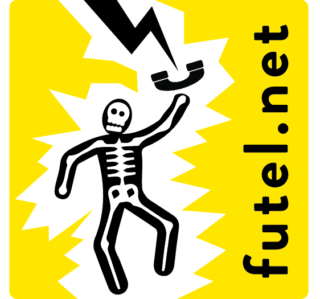 MARK: Can you give us an idea of the kinds of numbers you’re sharing on other Futel phones?
MARK: Can you give us an idea of the kinds of numbers you’re sharing on other Futel phones?
KARL: Besides the mayor, we have a directory of social service numbers and a directory of amusing numbers. The social service numbers are things like 211, a transportation service called Call To Safety, bus schedules, things like that. The amusing numbers include the Apology Line, which is one of our inspirations, it’s basically voicemail discussions as social art.
MARK: What about emergency calls? Is there any risk, given how the system is configured, that emergency calls may not go through? I mean this is all contingent on the wireless being operational and the internet being up, right? I’m just wondering if there’s any responsibility, when you place a public phone outside, to ensure that it connects… Is that something that you’ve thought about?
KARL: There is always risk, and there is great responsibility. If the power or net goes down, the phone goes down. All I can say is that reliability is the first priority, we monitor and notice when a phone isn’t connecting, and we test emergency calls with each release, and we’ve been more reliable than other payphones in the area. One user had to run over a mile and pass two non-working phones to use ours. One user had difficulties and got an operator to make a call. I do fear that someone will spend time someday trying to use a non-working Futel phone in an emergency. But I am certain that it is a net positive, the phones have been used to get emergency medical services at least twice.
MARK: Are there other areas of the country that you’d like to see Futel phones deployed?
KARL: Anywhere that gets public usage, although these days we want to get funded upfront before committing hardware, and someone local needs to be a point person.
MARK: What makes a community right for Futel? Are there certain demographic factors that you consider?
KARL: If we think there is a community that will use any aspect of a phone, it’s a good place. We’re supported by grants, so the ability to pay for everything is one factor. But if there are local stewards, we have low-cost options that are easier to start up.
MARK: I hear that you’ve got a grant being considered to roll out Futel payphones in multiple homeless encampments around Portland. Is that correct?
KARL: Yes! I don’t want to go into details until we know what happens there. But we will be putting some kind of service in several sites. If we don’t get this grant, we’ll just give them something less ambitious and figure out how to pay for it until we do get one.
MARK: OK, so the first time you were out here in Ypsi, we talked about putting a Futel phone outside the offices of Landline Creative Labs at 209 Pearl Street. And, since then, if I’m correct, you received an Ann Arbor Awesome Foundation grant to make it happen. Assuming that’s the case, what kind of timeline are we talking about? When might we see a Futel shell across from the Ypsi Transit Station?
KARL: I’m bringing IT hardware tomorrow, I like to bake it for a while and make sure it stays connected, then we just need to ship the outdoor hardware and have you connect it. I have everything, just need to refurb the enclosure and figure out how to ship it cheaply. Basically I’m relying on your expertise to install and maintain it. By the way, I hope to sneak an Ann Arbor phone installation in on the same grant. But that’s still to be determined.
[top: Futel’s Karl Anderson tests equipment at 209 Pearl Street in Ypsilanti the day after answering the above questions. bottom: Old friends Dug Song and Karl Anderson hack their way into the Landline Creative Labs communications backbone.]



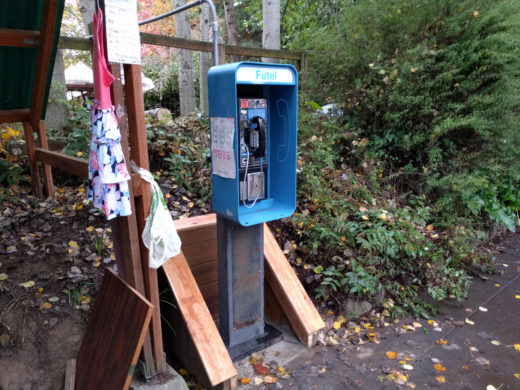
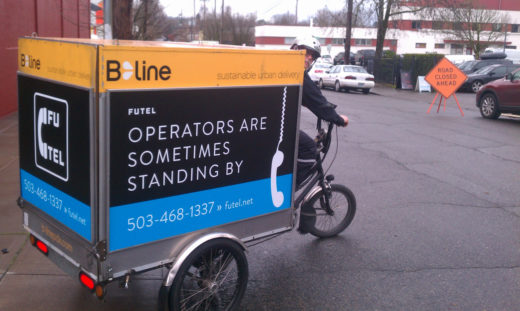
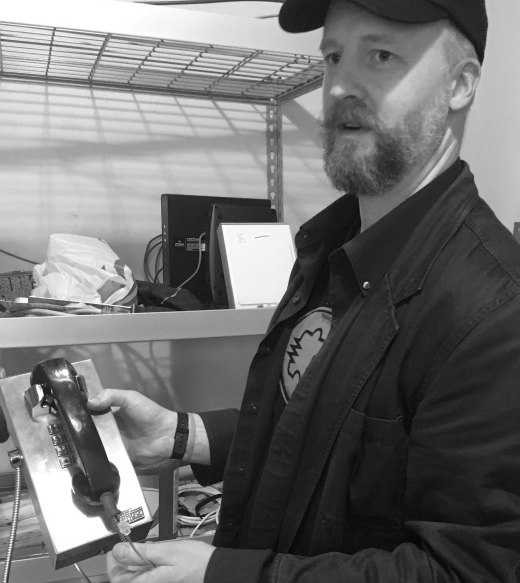
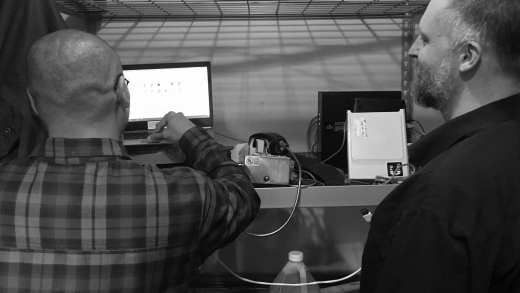











21 Comments
KEEP BUSINESS OUT OF YPSILANTI!!!!!!!!!
FREE YPSILANTI FROM CAPITALISM!!!!!!!!!!!!!!!!!!!!!!!!!
NO ONE SHALL PROFIT WITHIN THE BORDERS OF YPSILANTI!!!!!!!
Could there be a recording that aggregates information about all of the food pantries in town, their hours, etc? Also, how about information about public health issues, like getting off of opioids?
Coverage of the Futel Awesome grant in The Ann.
http://www.theannmag.com/a2-awesome-foundation-funds-free-public-phone-in-ypsi/
I’m waiting for some of these anti-capitalist progressives out there to point up an anti-capitalist country that offered greater social freedoms and progress than otherwise. Where are these progressive Marxist nations? How are queer people treated there? Is there no caiste system in place? Is power truly less concentrated and dispersed among the people? Do people across the board do better? Why have they never considered what it is about capitalist societies that allows for greater social freedoms? Do anti-capitalist progressives have no fear of state control? Why do they always seem to assume their interests will be represented by the state v the opposite? Why is it that those of us trying to create progress within the system we occupy find ourselves derided, dismissed and called names? Where is the model they advocate for? And, no, social democracies don’t count as they are capitalist systems?
What the fuck are anti-capitalists and anti-gentrifiers for? Do they even know? Or are they just reactively against the system they occupy without really exploring the risks posed by alternative systems? Is it possible that all human designed economic systems within human societies contain the potential catastrophic failure?
Correction of a system is different than opposition to it. In these times, it’s essential that people think more carefully about their rhetoric and look towards real answers.
When will we get serious on the left about looking at what works?
Ranting…
Oh yeah, but this is a cool neo-liberal enterprise. Must be something wrong with it.
Maybe weather information? Are there still weather lines that you can call?
Just curious, Jean. What do you think of when you use the term “neoliberal”?
The reason I ask is that it seems to have become a buzzword on the far left but I have found more than one definition of it and no one seems to be on the same page about its meaning. Some people use it to describe Keynesian style capitalism but others use it in more of an Ayn Rand or Chicago School style of capitalism and some really use it to describe ANY sort of capitalism at all.
Oh and fwiw, I like the phone idea and putting one across the street from the transit center seems like an especially good location for it
Phones are an order of magnitude less sanitary in terms of germ count as compared to toilet seats. I hope there is some sort of attempt at handset sanitation for these units, but maybe that is a “futel” endeavor.
Why the fuck can’t that guy mow his own lawn?
That’s a lot of anger directed at someone who, by the sound of it, was just trying to help out a local guy in need of work, Bob. Maybe you’d be better served focusing your wrath elsewhere. If you need help, I can make a few suggestions…. Like maybe focus on the Republicans who are working to take health care away from 24 million Americans, and not the guy who, on his own time, is working put telephones in homeless encampments. Just a suggestion.
Lynne– I was using neo-liberal in the current very very muddled cultural context. It is used as a term of ideological dismissal. Those who use it have rarely thought it through or explored it’s history. You are correct about the trajectory of meaning. It was originally used to refer to Milton Friedman et al– conservative economic theory– but then used to refer to Clintonian global politics. The originating book as used to critique liberal globalism, as I understand it, is here: https://www.amazon.com/gp/product/1935408534/ref=oh_aui_search_detailpage?ie=UTF8&psc=1
I read it this winter. It was moderately illuminating though extraordinarily one sided in its assessment (globalism is evil!/protectionism good). It’s clear most people on the left now use neoliberal to mean globalism and clintonianism and almost any private social enterprise. At base those who use it this way believe that the idea of doing any social good with market based initiatives is wrong. Not just wrong but a knowing con. Don’t be fooled, sheeple! It’s a vehicle for collective frustration with wealth concentration that makes sure to point the finger outwards– at corporations, developers etc. These are people who believe that economic growth is inherently bad and there’s some kind of wealth being hidden under the floor boards that just needs to be redistributed. They block economic initiatives and buildings (ie progress/change) that could actually help improve conditions. They create divisiveness that all but assures those initiatives won’t be well informed and won’t work.
Basically the term was hijacked as part of the 30 year campaign against HRC. It may have been a legitimate term of use, deriving from legitimate critique of globalist failures. But it has been hijacked and used as a means of wholesale ideological objection. There is inherently the untested assumption that protectionism works. It’s a red flag for me that whoever uses it likely has not thought their position through.
It really was just a joke. Given the general state of things, and the boring lectures, we need more. Have a nice blog.
Yes, Bob, the problem with social media these days, given ‘the general state of things,’ is that there aren’t enough jokes and there’s too much information and serious discussion.
Jean. Interesting. Yes, I too tend to immediately become suspicious of someone that they haven’t really thought things through if they use the term. Thanks for the book recommendation. It sounds like an interesting one.
FWIW, I hire someone to mow my lawn. I don’t think that is a good punchline though. It just is what it is. ;)
My friend Frank mows my lawn when I have the cash. I can’t afford it but he’s good company. It takes one thing off my list. His phone is also an unreliable means of communication. I usually just find him up at the Fleetwood, but I’m sure he would find a futel payphone useful here or near his garden in Detroit.
some thing for Jean Henry to read
http://www.rollingstone.com/politics/features/taibbi-goodbye-and-good-riddance-to-centrism-w487628
It will be interesting to see what happens in the 2018 midterms but my guess is the far left will notb turn out as usual.
My favorite paragraph from the article:
For decades pundits and pols have been telling progressive voters they don’t have the juice to make real demands, and must make alliances with more “moderate” and presumably more numerous “centrists” in order to avoid becoming the subjects of right-wing monsters like Reagan/Bush/Bush/Trump.
People have been saying it because it is true. The far left’s votes for Nader helped elect Bush, which didnt move our country to the left. The far left’s failure to accept HRC helped elect Trump, which didnt move our country to the left. And most importantly, the far left’s failure to vote in state, local, and national midterms has not helped move our country to the left. Prove me wrong but there IS a center left that is fairly large and that center tends to be more likely to get to the polls.
My second favorite paragraph is:
If 80 percent of Americans ever realized their shared economic situation, they could and probably should take over government. Of course, they wouldn’t just be taking power for themselves, they’d be taking it from the big-dollar donors who own such a disproportionately huge share of wealth in our society.
Good luck with that. Good luck convincing the 25% who voted for Trump that they were voting against their economic interests. Good luck getting more than 1/2 of the 25% to be enthusiastic about a far left agenda. And especially good luck getting the 50% who never vote at all to turn out. Yeah, it would be great if it happened but I am not holding my breath even though I would love to be proved wrong.
Poor people are aspirational and by and large love capitalism. The left will get nowhere with people oppressed by the State talking about government support systems and not jobs. Protectionism, which relies on xenophobia, has appeal but less lately according to polls. Globalism is gaining more acceptance in national polls of political sentiment. There is no part of me that thinks the system isn’t due for a huge correction, and that this creates a huge opportunity for leftward movement of governance (which I welcome). None of that means that an anti-capitalist, protectionist, big government agenda has broad appeal. The far left will need to reframe its message to gather enough momentum to have any substantial leverage in politics. The Dems have always been an uneasy coalition. If the far left splits off into a third party, it will still need to form an uneasy coalition to influence policy. I don’t consider myself a moderate. I support a fairly radical shift in the status quo. I juts have a different idea of how to get there than you Wobbile. It seems clear that you operate with an ideological straight line trajectory from good (far left) to bad (far right) and that you presume yourself to be to the far left. I don’t believe there are inherently good and bad parties or political positions– much less people. I think people who try to solve problems (including me) often make them worse. Every ideology warrants strict scrutiny and should welcome critique. I have never found discourse to be lively in the far left. It’s prescriptive and takes critique as personal insult. It’s incapable of representing more than the viewpoint of a few people whose social groups are maintained by alignment with the same ideology. It can never be a movement until it begins the process of self-critique. So called ‘Moderates’ do that all the time. They are hammered at by both sides relentlessly. As a result they can listen to what the people want, rather than tell them. HRC fell short on that count– at least publicly. But Bernie and his contingent was worse. No political movement can survive that rejects criticism as blasphemy.
The American working class want jobs, not government programs. The left needs to start talking about job creation (which we actually do well) and equity not govt programs (which I freely acknowledge are very necessary) if its going to win over the working class as a whole.
Unfortunately, job creation in an era of technical advances is easier said than done although some things like high minimum wages can help in the short term. Long term, we are going to have to accept that govt programs are ok or we are going to have even more desparate people.
Government programs and incentives can create jobs. The issue is how the left talks about these things. Privileged liberals fear corporate over-reach and trust the State. In my experience, the poor and marginalized distrust both equally. They want a voice and they want agency. Trump pretended to offer that, if only to white Christians. Clinton and Bernie did not, even though either of their policy objectives would have served the poor and working class better. I’m suggesting a re-framing that understands distrust of the government as well as corporate influence over it. The electorate have not proven very adept at assessing what’s in their best interests individually. (Collectively we are somewhat better) But the electorate is Gerry clear on what they don’t like. To achieve progress we need to defeat the appeal of negativity and plays to divisiveness with a positive vision of progress towards collective well being. I personally think HRC had that in her stronger together slogan and her policies, but she didn’t run on it. She ran against Trump more than she put forward her agenda. Negativity is easier. But the right is willing to play dirtier in that game. No one more so than Trump. Resistance to the current regime is a priority now but it’s not a winning campaign strategy. We do need to be re-thinking our messaging as many say– not according to separate ideological beliefs or condemnation, but according to what the people respond positively to.
Did you see this?
Times Square phone booths contain the recorded voices of 70 immigrants sharing their stories about coming to America cnn.it/2ulRsLx
3 Trackbacks
[…] « Futel’s campaign to bring back the public telephone, and the possibility that an Ypsil… […]
[…] centers. Well, as you may also recall, Anderson and I talked about the possibility that, one day, Ypsilanti might have a Futel phone of its own. And, today, I’m happy to announce that Ypsi’s free Futel payphone is officially open for […]
[…] following conversation between Anderson and Maynard on the history and objectives of Futel, was published on Maynard’s blog in June […]